Abstract
1. The nature of the receptor coupling mechanism of the 5-hydroxytryptamine4 (5-HT4) receptor in the circular smooth muscle of the human colon has been further investigated. 2. 5-HT stimulated cyclic AMP generation and caused a relaxation in a concentration-dependent fashion, with EC50 values of 175.5 and 274.9 nM respectively. DAU 6236 increased cyclic AMP formation and caused a relaxant effect but was a partial agonist relative to 5-HT. 3. The 5-HT4 receptor antagonist, GR 113808, inhibited cyclic AMP formation and relaxation induced by 5-HT with -log Ki values of 9.1 (cyclic AMP) and 8.9 (relaxation) and apparent pA2 values of 9.2 (cyclic AMP) and 9.5 (relaxation). 4. Ondansetron and methysergide failed to inhibit cyclic AMP formation or the relaxation induced by 5-HT. 5. The phosphodiesterase inhibitor, IBMX, produced a concentration-dependent relaxation (EC50 = 30 microM) and at 1 microM it enhanced the 5-HT-induced relaxation producing a leftward shift of the 5-HT concentration-effect curve with a concentration-ratio of 4.1. Rolipram caused a concentration-dependent relaxation (EC50 = 564.8 nM) and at 200 nm caused a leftward shift of the concentration-effect curve to 5-HT with a concentration-ratio of 5.5. 6. Application of the adenylyl cyclase inhibitor, SQ 22536 (0.1 mM), and the protein kinase inhibitors, H7 (100 nM) and H89 (200 nM), inhibited the relaxant effect of 5-HT inducing a rightward shift of the concentration-effect curve with concentration-ratios of 10.1, 2.7 and 4.2 respectively. 7. Forskolin stimulated cyclic AMP production and caused a relaxation. The maximum relaxant effect of forskolin (6 microM, 13.8 +/- 1.9 cm.s) was not significantly different from the maximum relaxant effect of 5-HT (10 microM, 12.7 +/- 4.9 cm.s). However, the cyclic AMP levels stimulated by forskolin (6 microM, 49.3 +/- 6.6 pmol mg-1) were markedly greater than those stimulated by 5-HT (10 microM, 7.6 +/- 2.0 pmol mg-1). 8. In conclusion, these results indicate that the 5-HT4 receptors of the circular smooth muscle of human colon mediate relaxation and inhibition of spontaneous contractions via activation of adenylyl cyclase, formation of cyclic AMP and activation of protein kinase A.
Full text
PDF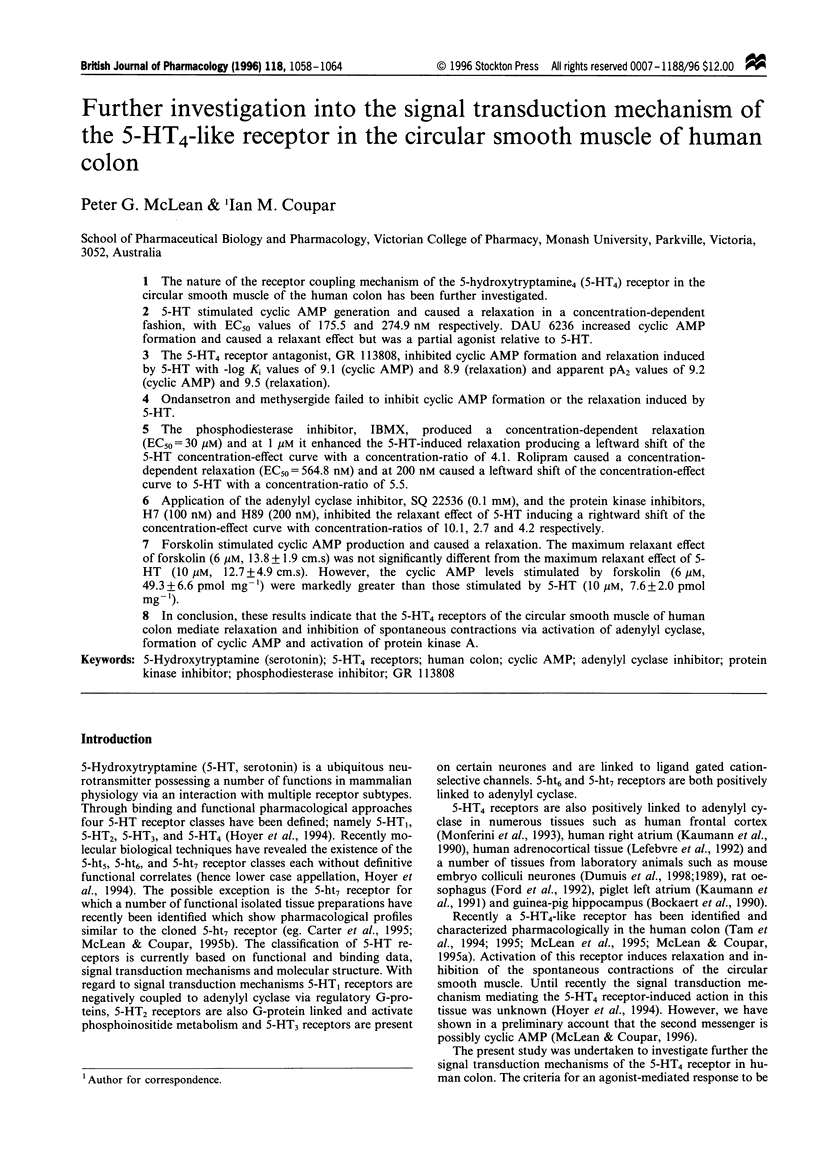
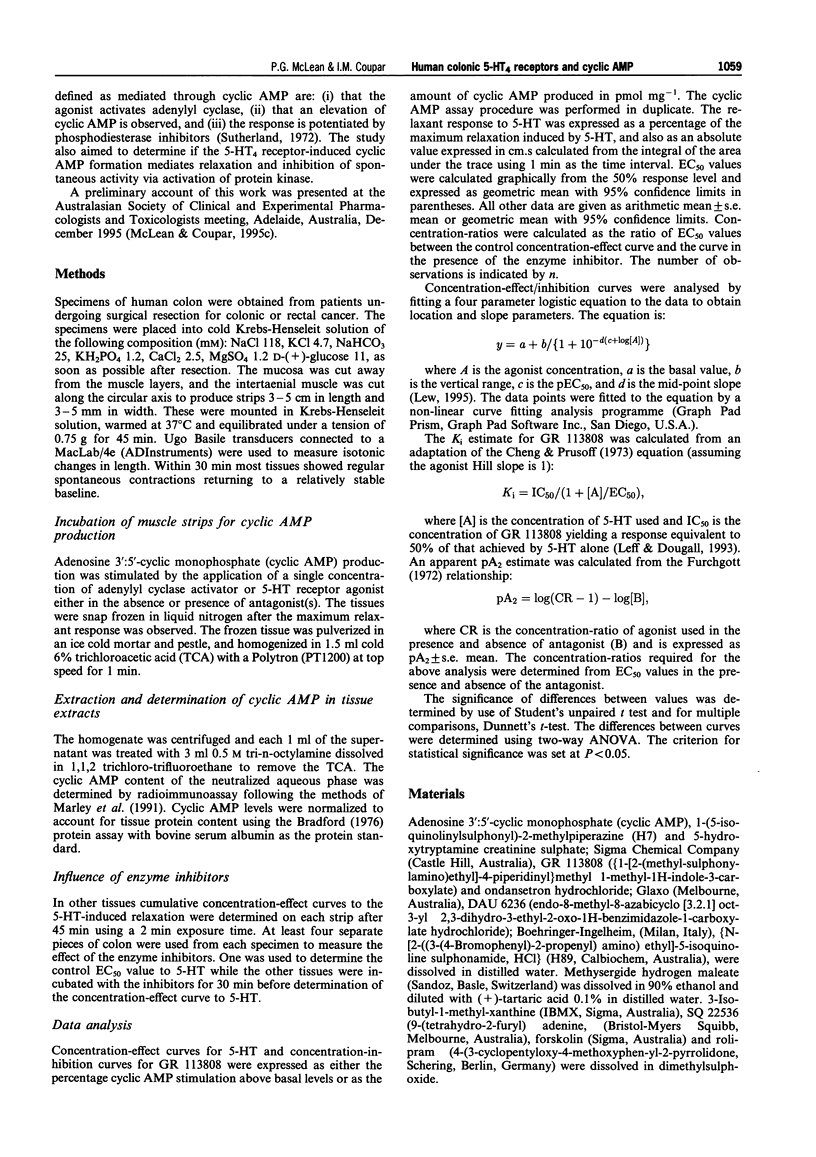
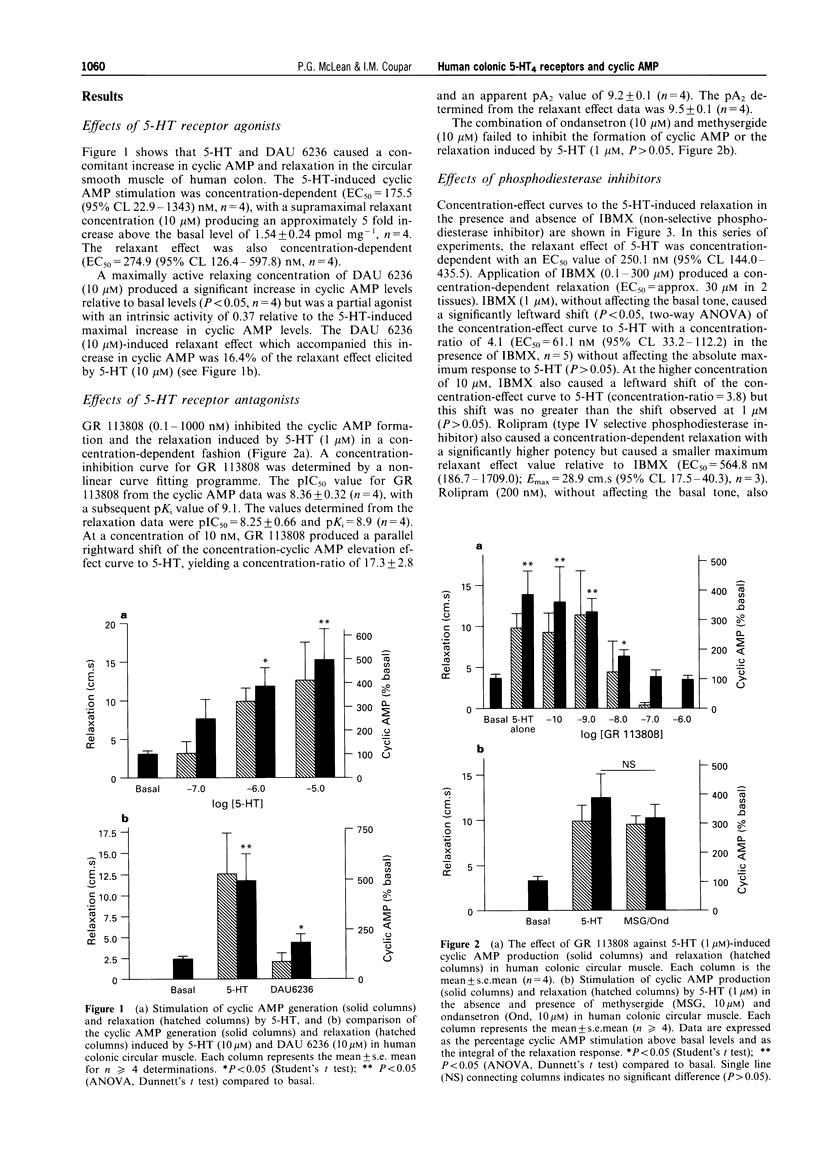
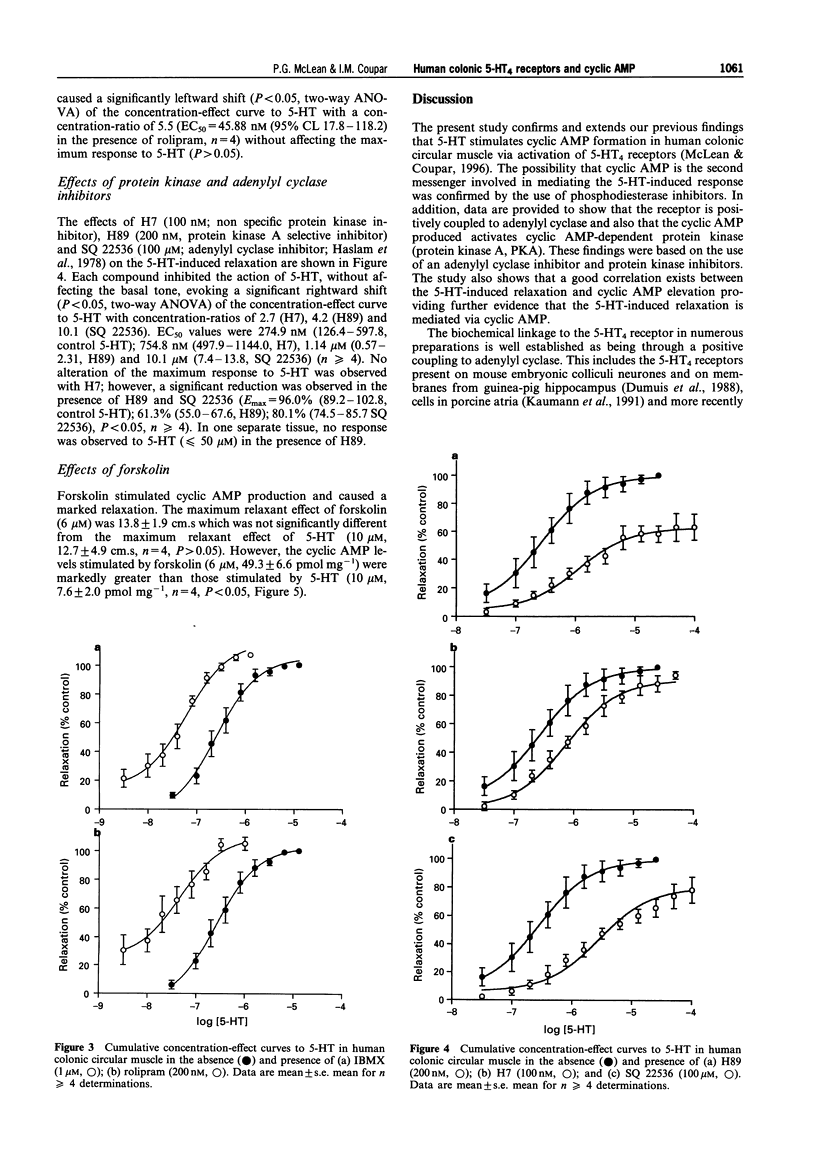
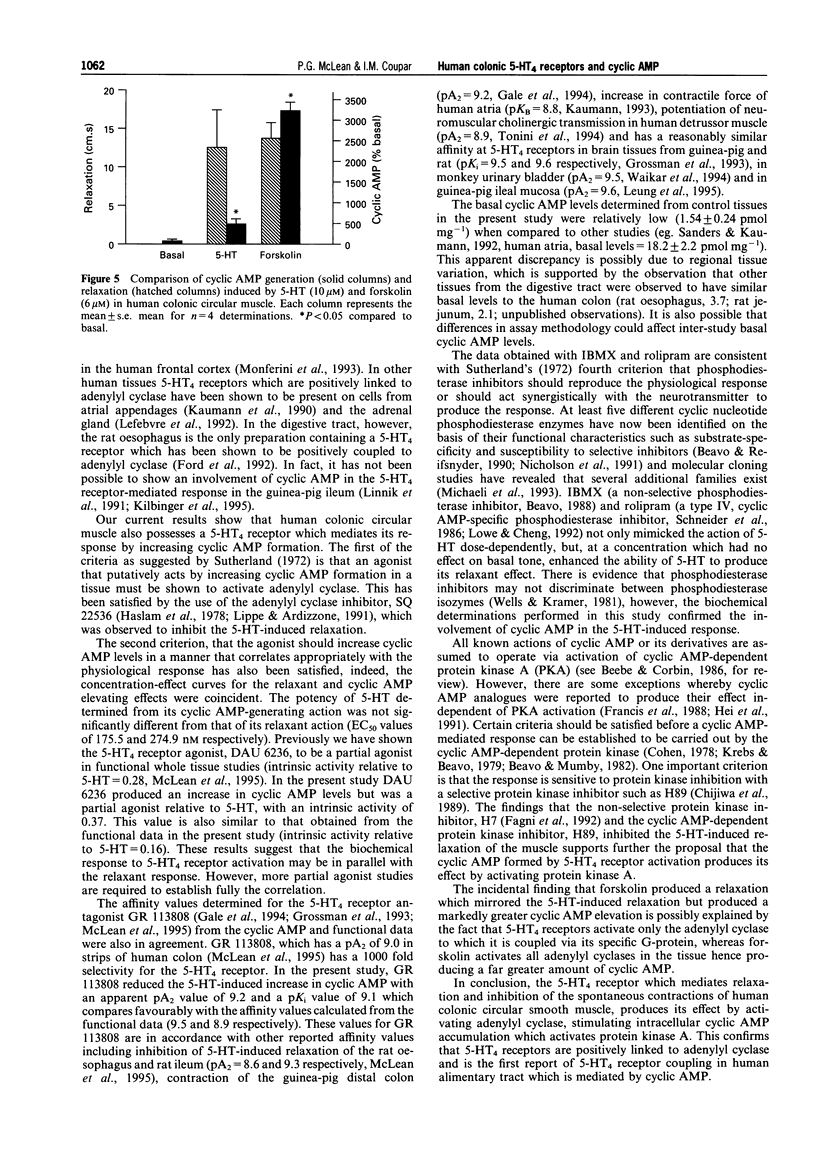
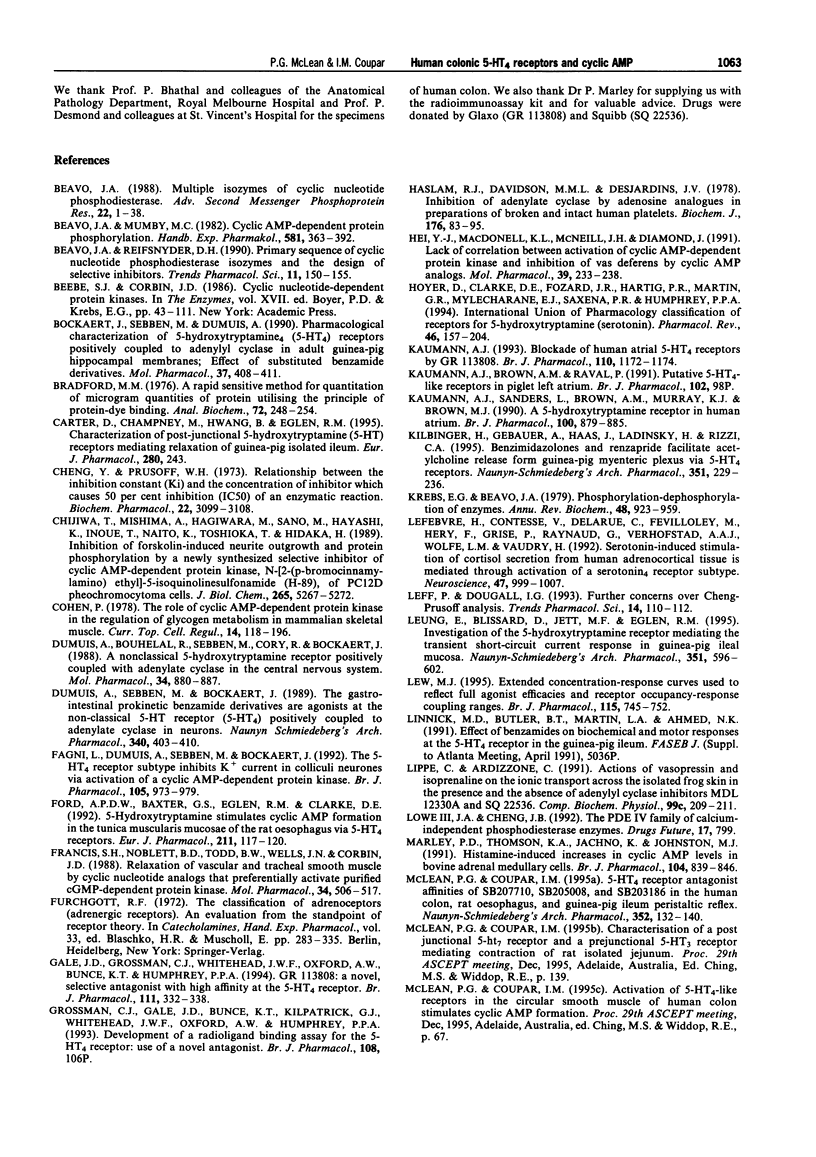
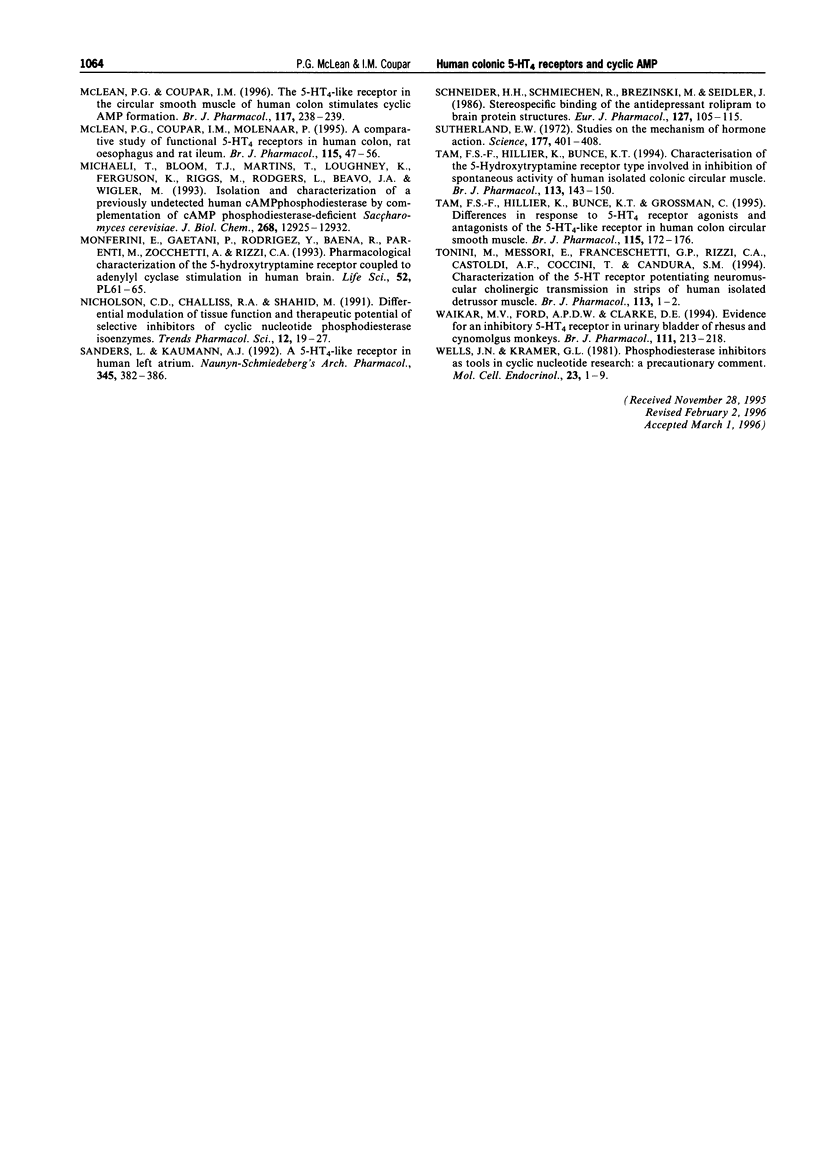
Selected References
These references are in PubMed. This may not be the complete list of references from this article.
- Beavo J. A. Multiple isozymes of cyclic nucleotide phosphodiesterase. Adv Second Messenger Phosphoprotein Res. 1988;22:1–38. [PubMed] [Google Scholar]
- Beavo J. A., Reifsnyder D. H. Primary sequence of cyclic nucleotide phosphodiesterase isozymes and the design of selective inhibitors. Trends Pharmacol Sci. 1990 Apr;11(4):150–155. doi: 10.1016/0165-6147(90)90066-H. [DOI] [PubMed] [Google Scholar]
- Bockaert J., Sebben M., Dumuis A. Pharmacological characterization of 5-hydroxytryptamine4(5-HT4) receptors positively coupled to adenylate cyclase in adult guinea pig hippocampal membranes: effect of substituted benzamide derivatives. Mol Pharmacol. 1990 Mar;37(3):408–411. [PubMed] [Google Scholar]
- Bradford M. M. A rapid and sensitive method for the quantitation of microgram quantities of protein utilizing the principle of protein-dye binding. Anal Biochem. 1976 May 7;72:248–254. doi: 10.1006/abio.1976.9999. [DOI] [PubMed] [Google Scholar]
- Carter D., Champney M., Hwang B., Eglen R. M. Characterization of a postjunctional 5-HT receptor mediating relaxation of guinea-pig isolated ileum. Eur J Pharmacol. 1995 Jul 14;280(3):243–250. doi: 10.1016/0014-2999(95)00195-q. [DOI] [PubMed] [Google Scholar]
- Cheng Y., Prusoff W. H. Relationship between the inhibition constant (K1) and the concentration of inhibitor which causes 50 per cent inhibition (I50) of an enzymatic reaction. Biochem Pharmacol. 1973 Dec 1;22(23):3099–3108. doi: 10.1016/0006-2952(73)90196-2. [DOI] [PubMed] [Google Scholar]
- Chijiwa T., Mishima A., Hagiwara M., Sano M., Hayashi K., Inoue T., Naito K., Toshioka T., Hidaka H. Inhibition of forskolin-induced neurite outgrowth and protein phosphorylation by a newly synthesized selective inhibitor of cyclic AMP-dependent protein kinase, N-[2-(p-bromocinnamylamino)ethyl]-5-isoquinolinesulfonamide (H-89), of PC12D pheochromocytoma cells. J Biol Chem. 1990 Mar 25;265(9):5267–5272. [PubMed] [Google Scholar]
- Cohen P. The role of cyclic-AMP-dependent protein kinase in the regulation of glycogen metabolism in mammalian skeletal muscle. Curr Top Cell Regul. 1978;14:117–196. doi: 10.1016/b978-0-12-152814-0.50008-3. [DOI] [PubMed] [Google Scholar]
- Dumuis A., Bouhelal R., Sebben M., Cory R., Bockaert J. A nonclassical 5-hydroxytryptamine receptor positively coupled with adenylate cyclase in the central nervous system. Mol Pharmacol. 1988 Dec;34(6):880–887. [PubMed] [Google Scholar]
- Dumuis A., Sebben M., Bockaert J. The gastrointestinal prokinetic benzamide derivatives are agonists at the non-classical 5-HT receptor (5-HT4) positively coupled to adenylate cyclase in neurons. Naunyn Schmiedebergs Arch Pharmacol. 1989 Oct;340(4):403–410. doi: 10.1007/BF00167041. [DOI] [PubMed] [Google Scholar]
- Fagni L., Dumuis A., Sebben M., Bockaert J. The 5-HT4 receptor subtype inhibits K+ current in colliculi neurones via activation of a cyclic AMP-dependent protein kinase. Br J Pharmacol. 1992 Apr;105(4):973–979. doi: 10.1111/j.1476-5381.1992.tb09087.x. [DOI] [PMC free article] [PubMed] [Google Scholar]
- Ford A. P., Baxter G. S., Eglen R. M., Clarke D. E. 5-Hydroxytryptamine stimulates cyclic AMP formation in the tunica muscularis mucosae of the rat oesophagus via 5-HT4 receptors. Eur J Pharmacol. 1992 Jan 28;211(1):117–120. doi: 10.1016/0014-2999(92)90272-6. [DOI] [PubMed] [Google Scholar]
- Francis S. H., Noblett B. D., Todd B. W., Wells J. N., Corbin J. D. Relaxation of vascular and tracheal smooth muscle by cyclic nucleotide analogs that preferentially activate purified cGMP-dependent protein kinase. Mol Pharmacol. 1988 Oct;34(4):506–517. [PubMed] [Google Scholar]
- Gale J. D., Grossman C. J., Whitehead J. W., Oxford A. W., Bunce K. T., Humphrey P. P. GR113808: a novel, selective antagonist with high affinity at the 5-HT4 receptor. Br J Pharmacol. 1994 Jan;111(1):332–338. doi: 10.1111/j.1476-5381.1994.tb14064.x. [DOI] [PMC free article] [PubMed] [Google Scholar]
- Haslam R. J., Davidson M. M., Desjardins J. V. Inhibition of adenylate cyclase by adenosine analogues in preparations of broken and intact human platelets. Evidence for the unidirectional control of platelet function by cyclic AMP. Biochem J. 1978 Oct 15;176(1):83–95. doi: 10.1042/bj1760083. [DOI] [PMC free article] [PubMed] [Google Scholar]
- Hei Y. J., MacDonell K. L., McNeill J. H., Diamond J. Lack of correlation between activation of cyclic AMP-dependent protein kinase and inhibition of contraction of rat vas deferens by cyclic AMP analogs. Mol Pharmacol. 1991 Feb;39(2):233–238. [PubMed] [Google Scholar]
- Hoyer D., Clarke D. E., Fozard J. R., Hartig P. R., Martin G. R., Mylecharane E. J., Saxena P. R., Humphrey P. P. International Union of Pharmacology classification of receptors for 5-hydroxytryptamine (Serotonin). Pharmacol Rev. 1994 Jun;46(2):157–203. [PubMed] [Google Scholar]
- Kaumann A. J. Blockade of human atrial 5-HT4 receptors by GR 113808. Br J Pharmacol. 1993 Nov;110(3):1172–1174. doi: 10.1111/j.1476-5381.1993.tb13937.x. [DOI] [PMC free article] [PubMed] [Google Scholar]
- Kaumann A. J., Sanders L., Brown A. M., Murray K. J., Brown M. J. A 5-hydroxytryptamine receptor in human atrium. Br J Pharmacol. 1990 Aug;100(4):879–885. doi: 10.1111/j.1476-5381.1990.tb14108.x. [DOI] [PMC free article] [PubMed] [Google Scholar]
- Kilbinger H., Gebauer A., Haas J., Ladinsky H., Rizzi C. A. Benzimidazolones and renzapride facilitate acetylcholine release from guinea-pig myenteric plexus via 5-HT4 receptors. Naunyn Schmiedebergs Arch Pharmacol. 1995 Mar;351(3):229–236. doi: 10.1007/BF00233241. [DOI] [PubMed] [Google Scholar]
- Krebs E. G., Beavo J. A. Phosphorylation-dephosphorylation of enzymes. Annu Rev Biochem. 1979;48:923–959. doi: 10.1146/annurev.bi.48.070179.004423. [DOI] [PubMed] [Google Scholar]
- Lefebvre H., Contesse V., Delarue C., Feuilloley M., Hery F., Grise P., Raynaud G., Verhofstad A. A., Wolf L. M., Vaudry H. Serotonin-induced stimulation of cortisol secretion from human adrenocortical tissue is mediated through activation of a serotonin4 receptor subtype. Neuroscience. 1992;47(4):999–1007. doi: 10.1016/0306-4522(92)90047-6. [DOI] [PubMed] [Google Scholar]
- Leff P., Dougall I. G. Further concerns over Cheng-Prusoff analysis. Trends Pharmacol Sci. 1993 Apr;14(4):110–112. doi: 10.1016/0165-6147(93)90080-4. [DOI] [PubMed] [Google Scholar]
- Leung E., Blissard D., Jett M. F., Eglen R. M. Investigation of the 5-hydroxytryptamine receptor mediating the "transient" short-circuit current response in guinea-pig ileal mucosa. Naunyn Schmiedebergs Arch Pharmacol. 1995 Jun;351(6):596–602. doi: 10.1007/BF00170158. [DOI] [PubMed] [Google Scholar]
- Lew M. J. Extended concentration-response curves used to reflect full agonist efficacies and receptor occupancy-response coupling ranges. Br J Pharmacol. 1995 Jul;115(5):745–752. doi: 10.1111/j.1476-5381.1995.tb14996.x. [DOI] [PMC free article] [PubMed] [Google Scholar]
- Lippe C., Ardizzone C. Actions of vasopressin and isoprenaline on the ionic transport across the isolated frog skin in the presence and the absence of adenyl cyclase inhibitors MDL12330A and SQ22536. Comp Biochem Physiol C. 1991;99(1-2):209–211. doi: 10.1016/0742-8413(91)90101-x. [DOI] [PubMed] [Google Scholar]
- Marley P. D., Thomson K. A., Jachno K., Johnston M. J. Histamine-induced increases in cyclic AMP levels in bovine adrenal medullary cells. Br J Pharmacol. 1991 Dec;104(4):839–846. doi: 10.1111/j.1476-5381.1991.tb12515.x. [DOI] [PMC free article] [PubMed] [Google Scholar]
- McLean P. G., Coupar I. M. 5-HT4 receptor antagonist affinities of SB207710, SB205008, and SB203186 in the human colon, rat oesophagus, and guinea-pig ileum peristaltic reflex. Naunyn Schmiedebergs Arch Pharmacol. 1995 Aug;352(2):132–140. doi: 10.1007/BF00176766. [DOI] [PubMed] [Google Scholar]
- McLean P. G., Coupar I. M., Molenaar P. A comparative study of functional 5-HT4 receptors in human colon, rat oesophagus and rat ileum. Br J Pharmacol. 1995 May;115(1):47–56. doi: 10.1111/j.1476-5381.1995.tb16318.x. [DOI] [PMC free article] [PubMed] [Google Scholar]
- McLean P. G., Coupar I. M. Stimulation of cyclic AMP formation in the circular smooth muscle of human colon by activation of 5-HT4-like receptors. Br J Pharmacol. 1996 Jan;117(2):238–239. doi: 10.1111/j.1476-5381.1996.tb15182.x. [DOI] [PMC free article] [PubMed] [Google Scholar]
- Michaeli T., Bloom T. J., Martins T., Loughney K., Ferguson K., Riggs M., Rodgers L., Beavo J. A., Wigler M. Isolation and characterization of a previously undetected human cAMP phosphodiesterase by complementation of cAMP phosphodiesterase-deficient Saccharomyces cerevisiae. J Biol Chem. 1993 Jun 15;268(17):12925–12932. [PubMed] [Google Scholar]
- Nicholson C. D., Challiss R. A., Shahid M. Differential modulation of tissue function and therapeutic potential of selective inhibitors of cyclic nucleotide phosphodiesterase isoenzymes. Trends Pharmacol Sci. 1991 Jan;12(1):19–27. doi: 10.1016/0165-6147(91)90484-a. [DOI] [PubMed] [Google Scholar]
- Quilley C. P., Lin Y. S., McGiff J. C. Chloride anion concentration as a determinant of renal vascular responsiveness to vasoconstrictor agents. Br J Pharmacol. 1993 Jan;108(1):106–110. doi: 10.1111/j.1476-5381.1993.tb13447.x. [DOI] [PMC free article] [PubMed] [Google Scholar]
- Sanders L., Kaumann A. J. A 5-HT4-like receptor in human left atrium. Naunyn Schmiedebergs Arch Pharmacol. 1992 Apr;345(4):382–386. doi: 10.1007/BF00176614. [DOI] [PubMed] [Google Scholar]
- Schneider H. H., Schmiechen R., Brezinski M., Seidler J. Stereospecific binding of the antidepressant rolipram to brain protein structures. Eur J Pharmacol. 1986 Aug 7;127(1-2):105–115. doi: 10.1016/0014-2999(86)90210-4. [DOI] [PubMed] [Google Scholar]
- Sutherland E. W. Studies on the mechanism of hormone action. Science. 1972 Aug 4;177(4047):401–408. doi: 10.1126/science.177.4047.401. [DOI] [PubMed] [Google Scholar]
- Tam F. S., Hillier K., Bunce K. T. Characterization of the 5-hydroxytryptamine receptor type involved in inhibition of spontaneous activity of human isolated colonic circular muscle. Br J Pharmacol. 1994 Sep;113(1):143–150. doi: 10.1111/j.1476-5381.1994.tb16186.x. [DOI] [PMC free article] [PubMed] [Google Scholar]
- Tam F. S., Hillier K., Bunce K. T., Grossman C. Differences in response to 5-HT4 receptor agonists and antagonists of the 5-HT4-like receptor in human colon circular smooth muscle. Br J Pharmacol. 1995 May;115(1):172–176. doi: 10.1111/j.1476-5381.1995.tb16335.x. [DOI] [PMC free article] [PubMed] [Google Scholar]
- Tonini M., Messori E., Franceschetti G. P., Rizzi C. A., Castoldi A. F., Coccini T., Candura S. M. Characterization of the 5-HT receptor potentiating neuromuscular cholinergic transmission in strips of human isolated detrusor muscle. Br J Pharmacol. 1994 Sep;113(1):1–2. doi: 10.1111/j.1476-5381.1994.tb16163.x. [DOI] [PMC free article] [PubMed] [Google Scholar]
- Waikar M. V., Ford A. P., Clarke D. E. Evidence for an inhibitory 5-HT4 receptor in urinary bladder of rhesus and Cynomolgus monkeys. Br J Pharmacol. 1994 Jan;111(1):213–218. doi: 10.1111/j.1476-5381.1994.tb14046.x. [DOI] [PMC free article] [PubMed] [Google Scholar]
- Wells J. N., Kramer G. L. Phosphodiesterase inhibitors as tools in cyclic nucleotide research: a precautionary comment. Mol Cell Endocrinol. 1981 Jul;23(1):1–9. doi: 10.1016/0303-7207(81)90112-x. [DOI] [PubMed] [Google Scholar]


